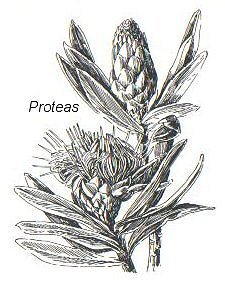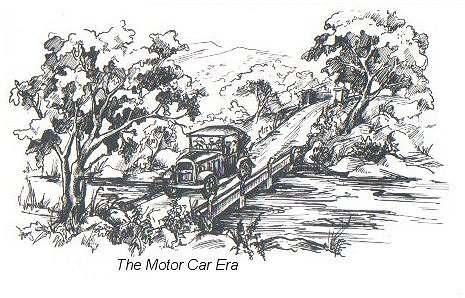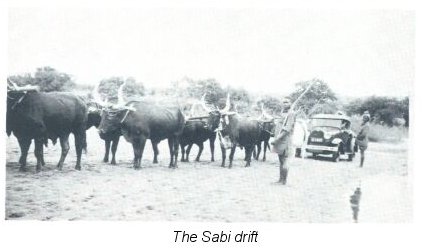
Melsetter, with its main road still very bad and the internal ones
mostly non-existent, was now right into the
motorcar
era. Many difficulties
described went on beyond the 1930s, and travelling continued to be a hazardous
experience. The road over the mountains was narrow, steep, winding and muddy or
dusty according to weather. Everyone tried to avoid travelling towards Cashel on
R.M.S. days, because it was a most unpleasant experience to meet a Railway lorry
round a corner when one�s own car was on the outside of the road and there was
only just room to pass one another and a terrifying drop on one�s own side of
the road.
For the 98-mile journey to Umtali four hours were allowed for an
uninterrupted run, but punctures and other mishaps often lengthened the time,
and a day return trip was seldom attempted. The condition of the road was a
constant cause of concern and complaints were also made about the gates which
were a distinct setback to tourists and so tedious to regular users.
During the early 1930s a great improvement was the laying of strips for
the first 25 miles from Umtali to the Mpudzi river, when the very bad sandy
stretches which had caused so much trouble were at last eliminated. Strip roads
were an advance, but there were snags: the verges were apt to become very
washed-out, the clouds of dust which rose up as cars and lorries came off the
strips to pass one another could be very dangerous, and the roads were laid on
tracks which had grown up with oxwagon traffic and wound in and out of trees and
round any obstructions so that there were many dangerous blind bends.

On trips away one never knew whether one would get back on the day
planned, and everyone always took blankets, a kettle and iron rations in case
one was stuck for the night, and chains and spades were normal equipment. Floods
and swollen rivers held travellers up, and roads were turned into impassable
bogs or rendered so slippery that cars skidded broadside down the hills. On
occasion travellers had to abandon their cars and walk home, slipping and
sliding in the dark on the muddy roads.
In 1930 the Road Motor Service was accelerated: the lorries left Umtali
at 7.15 am. and arrived at Melsetter at 5.15 p.m. The European passenger fare
for the circular route. Umtali-Melsetter-Chipinga was advertised at �4.
Passenger accommodation was two seats in the cab beside the driver, on which
three people could just be squeezed in. A few months later the circular trip was
improved by the introduction of two lorries fitted with semi-passenger bodies to
accommodate 6-8 passengers and to carry about two tons of mail and parcels.
Tickets for the three-day round trip, including hotel accommodation at Chipinga
and Melsetter, then cost about �5.

Travelling to or from the west the Sabi river had to be crossed by the
Sabi Drift which was open for motor traffic during the dry season, usually from
May but some years the river was at the deep water stage until July. A span of
oxen was kept on the Fort Victoria side to tow motorists across for �1, and was
summoned by ringing a gong and beating a drum kept on the river banks or banging
on a big sheet of iron hanging from a tree. Crossing the mile-wide drift was
supposed to take about half an hour, but travellers had to allow another hour
for the oxen to be collected and in-spanned and, if necessary, brought
across to the east bank. The in-spanned oxen drew the car over
the sandbanks and through the water, which in places came
through the floor into the car and it was in- advisable to carry
luggage on the runningboards. The ox driver watched the car�s front
wheels carefully and directed the car driver to keep in line with the
direction of travel.
Rose retired and Dr. Kennedy was posted here as District Surgeon for a
short period, and then Melsetter was without a doctor for some months until Dr.
D. M. MacRae took over in 1931.

Many efforts were made to get a golf course going, and during the
decade courses were laid out in front of the hotel and near the racecourse on
which games were played, but interest flagged, revived and flagged again.
Occasional games of rugby and hockey were played on the Sports Ground. The
Gymkhana Club was very active, with the annual Meeting a very big event well
supported by local and outside horses and riders.
The Tennis Club prospered although the courts in the dip between The
Gwasha and the School road had two big disadvantages: the sun was off them by
about 3 p.m., and the stream which flowed between them washed away part of both
courts for many years. The Club paid the V.M.B. 1/- a year rent and 10/- a month
for upkeep until 1936, when the Club was charged 10/ - a year for the lease and
kept up the courts themselves. Matches against Chipinga and Cashel were played
frequently, and many happy tennis afternoons ended with a singsong around the
hotel piano, and the service hatch between bar and lounge has memories for many
Melsetter residents who passed through it.
By 1930 there had been a distinct rise in the value of land:
applications for loans showed that land was being acquired at prices up to 500%
above its previous value, which was attributed to the improvement of roads, but
in Parliament John Martin protested strongly at the continued neglect of
Melsetter by the Agricultural Department.
Miss Elmina Doner came straight from Canada to Rusitu Mission in June
1930. From Umtali she travelled on the Railway lorry with the Rev. Clyde and
Mrs. Dotson to Melsetter, where Hatch met them with a new 5-ton lorry which was
still an event in the district. The three boys in the back had every little
while to get out and work on parts of the road, filling washouts and removing
boulders, and it took most of the day to reach Rusitu.
Dotson was the Station head and a man of all jobs. In the school Elmina
joined Alma Gahm who had come in 1926 and Lillian Taylor who had started there
in 1929. Elmina taught in a little mud hut which had small holes for windows; a
board painted black stood near the door; and at a table down the middle sat the
nine pupils. They were teen-agers from 12 up, one of whom is now a doctor and
another a teacher; they used scratchy pencils on slates, and had one small
English book for each to learn the English language.

Nursing under those conditions was not easy, and the fact that Elmina
had taken a nursing as well as a teaching course was very useful because there
were lots of emergencies. One crisis was when Ruth Dotson, aged about two, had
fever. Katie Allen, the nurse, did everything possible for her, but at last had
to tell the parents that they must try to get her to Mount Silinda Hospital. Mr.
and Mrs. Dotson started out that night with Ruth and Miss Allen. The Nyahode
river on Bloemhof was very full but they drove in and just about in the middle
they stuck on a boulder, the engine died, and there they sat with the flood
waters rushing past, sometimes almost lifting the lorry. There was nothing to do
but pray, and next morning Fred Delaney pulled the lorry out with oxen. When it
was dried off they were at last able to get on to Mount Silinda, where Ruth
recovered.
It was difficult to get patients to come for treatment, especially the
women, as their husbands would not allow them to come to the maternity hospital
to have their babies, and when they were nearly at death�s door they sent for
assistance and it was then so often too late to be able to help them.
During the rains the Mission was sometimes completely cut off when the
Nyahode river was in flood. Once when they could not cross all the Mackenzies
who farmed on Killin and all the Rusitu folks stayed at Olive Cliff, where Mrs.
Delaney kindly spread two rooms full of blankets and they slept on the floor.
Other friends who were most welcoming and kind were the Cronwrights in
Melsetter.
On a visit to Mozambique a group, with Mission pupils as carriers,
walked 150 miles on a preaching and inspection tour, trying to find the people
and acquaint them with the mission and its aims. They had stopped in the forest
and got everything out ready to eat when suddenly they heard the growl of a
leopard close by. In complete silence everything went back into the baskets, the
baskets onto the carriers� heads, and all moved off very quickly.
Another time Elmina was the only European on an expedition when they
heard elephants tearing down trees and pulling off branches, but could not see
them clearly because of the forest. The leader signalled for her and the girls
to get well to one side, while he and the boys lined up on the side nearer the
elephants and they carried on. Later she asked one of the boys, who was armed
with a little stick about two feet long, what he would have done if the
elephants had charged. �Oh�, he said, �I don�t know. But anyway they would have
killed us boys first.�
There were many firsts in those ten years: The first woman to come to
hospital to have her baby there, who spread the word around: �Oh, it is just
wonderful how you are taken care of; you just lie there, and everything is done
for you.� The first twins who, as the result of Mission teaching, were allowed
to live: people watched them for years, expecting some calamity to come to their
family, but they grew up and astonished everybody. The first young man to
build a house for his bride instead of taking her to his father�s home: the old
people shook their heads and wondered who would teach her anything. The first
permanent roof on an African house, of which the owner was very proud, and went
around saying that there would be no more cutting and hauling thatch, and no
more leaks in the house. The first woman to have a sewing machine, around whom
crowds gathered to get her to sew for them. The first ploughing with oxen, when
an old mbuya sat on a rock at the side exclaiming: �Look, look, how fast it
goes.�
Superstition and ignorance hampered the people, who would eat wild
fruits but would not plant fruit trees or make too good a garden in case
somebody should bewitch them; nobody thought of making a permanent house and
they moved from place to place often for superstitious reasons such as having to
move away from spirits if someone got ill. Dotson translated the Bible
into chiNdau, assisted by the Rev. Makinase Bgwerudza, the Rev. Mr. Marsh of
Mount Silinda, and others.
Melsetter Township was originally laid out with small stands on a grid
system, most unsuitable for hilly terrain, and no Commcmage plots were laid out.
In 1931 the V.M.B. was advised that a new survey was due to be carried out very
shortly; and there followed eighteen years of frustration waiting for that
survey, while the V.M.B.�s regular and frequent letters were seldom acknowledged
and Melsetter suffered from unfulfilled promises and the complete ignoring of
its very existence at times, let alone its needs. In 1932 the Secretary for
Agriculture in person told the V.M.B. that a representative of the Department
would come to select suitable sites for commonage plots, and in 1933 the
Minister of Agriculture came to discuss the matter, but nothing further
happened.
In the meantime the V.M.B. had immediate problems needing attention.
The water supply caused concern, with blockages being attributed to various
causes: residents diverting the furrow at unauthorised times, moles, dead frogs,
porridge being washed in it, the furrow being diverted to a resident�s fowl-run,
and horses drinking and crossing:
the N.C. threatened to forbid horses being
kept in the village if there were continual complaints about the water but it
was pointed out that this would be a great hardship to people who rode in ahd
wished to offsaddle there. The Watercart to the Police Camp did not comply with
the Width of Tyre Ordinance and so damaged the roads. The water supply was
doubled through work at the source, and an experiment was carried out of
paving a section of the furrow with stone, with piping under the bridge.

The stream between the Police Camp and the village was dammed and an
openair swimming-bath was opened. The Dutch Reformed Church objected to there
being no shelter round it as they considered it a threat to moral life. The
V.M.B. disagreed with this view, but a few months later the project had to be
abandoned in any case as the dam would not hold water.
The upkeep of the roads was a matter of longstanding concern, with
wheel-harrows the main equipment although on occasion a scotchcart and four
mules was hired at 1 / - a load for carting gravel for the streets.
The early-planted gum and cypress trees needed constant attention.
Silver wattles kept on getting out of hand and having to be eradicated: each
time this was done success was reported but each time the success was
short-lived, and fireguards were also a recurrent problem.
In the 1930s Dr. MacRae was foremost in advocating the planting of
ornamental trees, and was supported by the V.M.B. in arranging for pruning and
tidying and labour. Over 1 200 trees were planted on the commonage in 1932, and
a further 1 000 cypresses in The Gwasha grounds.
In 1931 the Chipinga Magistracy was established and was then
independent of Melsetter. The V.M.B. agreed to act as the Memorial Hall
Committee, and their first move was to re-open the library with an annual
subscription of 10/ 6d per family. They spent �10 on books, more money of
shelving, and a Library sub-committee was formed.
A plaque was attached to
the front wall of the Hall:
1914� 1919
IN HONOURED MEMORY OF
J. D. BINDE A. L. BRADBURY J. P. GIFFORD H. C. LOWRY
A. MAYNE T. J. PINE-COFFIN H. J. SIMPSON
MEN OF MELSETTER DISTRICT
WHO NOBLY RESPONDED TO THE CALL TO ARMS
AND WHO FELL IN THE GREAT WAR.
GREATER LOVE HATH NO MAN THAN THIS.